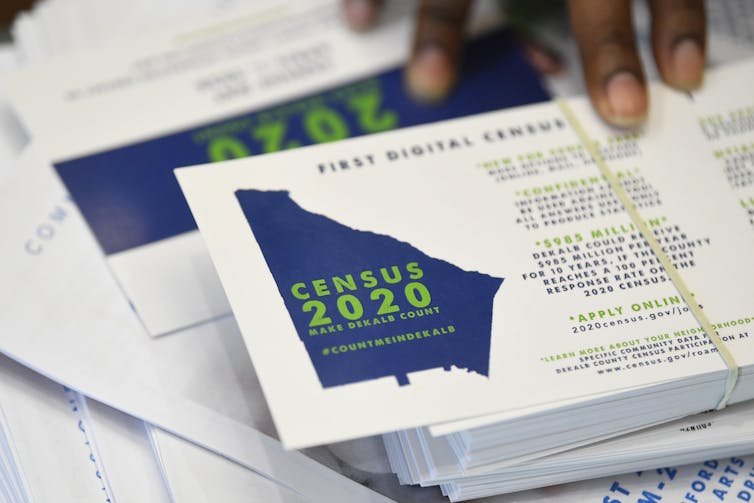Why undocumented immigrants still fear the 2020 census
- Written by Mary Lehman Held, Associate Professor of Social Work, University of Tennessee
The United States might not be able to get information about more than 10 million people in the 2020 census.
That’s the number of undocumented immigrants[1] living in the United States. Another 16.7 million individuals live in a household with an undocumented member and so might also not be counted in this year’s census.
The primary reason that undocumented immigrants might forego participation in the 2020 census? Fear[2].
Fear of being found by immigration enforcement authorities. Fear of being detained to face a deportation hearing. And, ultimately, fear of being deported.
If data is missing from the 2020 census, that will harm national and community planning efforts[3].
Fear of deportation
The fear of being deported to one’s home country extends well beyond wanting to remain in the United States to simply have a better life.
A large proportion of recently arrived undocumented immigrants are from the northern triangle regions of Central America that include El Salvador, Guatemala and Honduras. Though approximately 1.2 million Mexican immigrants in the U.S. returned[4] to their home nation between 2010 and 2018, an estimated 265,000 Central Americans[5] are fleeing annually to the United States, due to extreme violence and high murder rates[6].
There are 4.1 million U.S. citizen children[7] who have an undocumented parent. Deported parents will often protect their children by leaving them behind in the U.S. This potential, and likely permanent, separation feeds the fear endured by undocumented immigrant parents.
Increased immigration enforcement policies[8] and threats[9] of more raids and detentions by Immigration and Customs Enforcement have escalated the fear associated with deportation.
In two qualitative studies that colleagues and I conducted with health and social service providers serving documented and undocumented Latinx immigrants in Texas[10] and Tennessee[11], fear of detention and deportation emerged as a consistent component of immigrants’ daily lives.
Fear was described as so intense that undocumented immigrants avoid using medical or social services, even when their children have known medical needs. Texas providers reported that parents are unwilling to share their home addresses, since permitting outsiders into one’s home can pose risk of detection and, ultimately, deportation.
Census effects
Despite the mandated protections[12] that prevent the U.S. Census Bureau from sharing information with law enforcement or other government organizations, fear and lack of trust[13] of the government could very well supersede undocumented immigrants’ willingness to participate.
Interviews and focus groups[14] conducted by the Census Bureau suggest that immigrants fear their responses would be used to identify and penalize them or their undocumented household members.
Furthermore, among those who do participate, data might be incomplete or inaccurate[15] as a result of fear. For example, evidence suggests that proposals to include a citizenship question[16], though ultimately thrown out by the Supreme Court, would possibly result in more unanswered questions related to age, race and Latinx household members on the census, especially among individuals who were born in Mexico or Central America.
 A worker gets ready to pass out instructions in how fill out the 2020 census during a town hall meeting in Lithonia, Georgia.
AP Photo/John Amis[17]
A worker gets ready to pass out instructions in how fill out the 2020 census during a town hall meeting in Lithonia, Georgia.
AP Photo/John Amis[17]
Counting matters
How might these high levels of fear influence the 2020 census?
School, voting and legislative district boundaries will be based on incorrect figures. Allocation of resources for schools[18] and communities will fail to account for the accurate number or demographics of community members. Researchers, businesses and community organizations will design and implement projects based on misinformation.
If the Census Bureau wants to overcome barriers to participation, it will have to make efforts to educate and facilitate participation among undocumented immigrants[19].
Some ideas might include educating immigrants[20] about how census data are used, in their native languages, or sharing information through trusted community members[21] or organizations[22] serving undocumented immigrants. Flyers, emails and texts from these organizations could potentially serve as an invaluable tool to disseminate accurate content related to the census.
Another idea is that the federal government might be able to reduce fear by ceasing immigration enforcement[23] activity while 2020 census data are actively being collected.
The United States has an opportunity to accurately assess who resides in our country and in our communities. Fostering a climate of safety around the census is essential to achieving a complete count.
[Like what you’ve read? Want more? Sign up for The Conversation’s daily newsletter[24].]
References
- ^ undocumented immigrants (www.pewresearch.org)
- ^ Fear (www.kff.org)
- ^ national and community planning efforts (www.prb.org)
- ^ 1.2 million Mexican immigrants in the U.S. returned (journals.sagepub.com)
- ^ an estimated 265,000 Central Americans (fas.org)
- ^ extreme violence and high murder rates (worldpopulationreview.com)
- ^ 4.1 million U.S. citizen children (www.americanimmigrationcouncil.org)
- ^ immigration enforcement policies (www.ncsl.org)
- ^ threats (www.pewtrusts.org)
- ^ Texas (doi.org)
- ^ Tennessee (doi.org)
- ^ protections (www.census.gov)
- ^ fear and lack of trust (www.census.gov)
- ^ Interviews and focus groups (www2.census.gov)
- ^ incomplete or inaccurate (www2.census.gov)
- ^ citizenship question (scholar.harvard.edu)
- ^ AP Photo/John Amis (www.apimages.com)
- ^ Allocation of resources for schools (www.edweek.org)
- ^ to educate and facilitate participation among undocumented immigrants (censuscounts.org)
- ^ educating immigrants (hagasecontar.org)
- ^ trusted community members (censuscounts.org)
- ^ organizations (populardemocracy.org)
- ^ ceasing immigration enforcement (www.nnirr.org)
- ^ Sign up for The Conversation’s daily newsletter (theconversation.com)
Authors: Mary Lehman Held, Associate Professor of Social Work, University of Tennessee
Read more https://theconversation.com/why-undocumented-immigrants-still-fear-the-2020-census-132842

